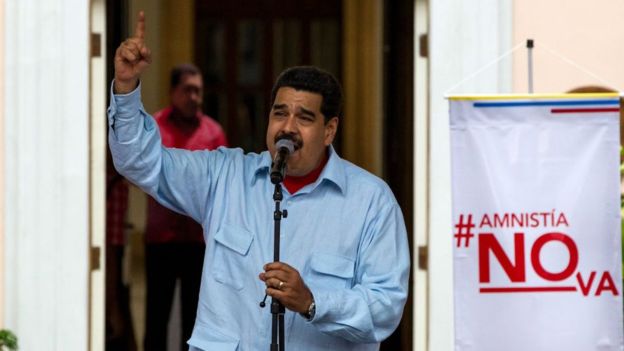Considering that «nothing leads or collaborates to a national reconciliation» but seeks «an outrageous impunity to the public morality detriment, subverting the moral and legal order of the country,» the Supreme Tribunal of Justice (TSJ) annulled the Law of Amnesty and National Reconciliation issued by the opposition majority of the National Assembly on 29 March 2016.
The pronouncement was issued by the Constitutional Chamber in its judgment 264, in which it responded to the request made by President Nicolás Maduro to review the constitutionality of the instrument.
In the ruling, drafted jointly by the seven members of the Chamber, it endorsed the questions raised by the government and the ruling party against the text, one of the main opposition offers in the 2015 election campaign, in relation to which it would leave unpunished crimes against human rights. The chavismo renamed the text as «Criminal Amnesia Law» and went so far as to say that it would favor drug dealers and corrupts.
“Failing to address the victims’ rights would bring international responsibility to the Venezuelan state, as it would demonstrate the general will expressed in a law to assume the consequences of impunity in the objective violation of Human Rights,» can be read in the statement.
Despite the concern about the international consequences of the application of the Law, the Chamber rejected that the instrument be based on opinions and rulings of the Inter-American Court of Human Rights or the UN Working Group on Arbitrary Detentions, on the grounds that it infringed upon the national sovereignty.
In the same way, the Constitution interpreter accused the parliament of overstepping itself by seeking to amnesty not only crimes but also administrative misdemeanors something that «goes beyond the exceptional nature» of Amnesty and which implies «flagrant ignorance of the legality and constitutionality of the sanctions imposed by the Office of the Comptroller».
Like the Government, the justices considered that the instrument looked for the self-pardon by attacks against the democratic institutionalism and warned of the consequences that this could entail. «If political violence is legitimized we renounce our own democratic integrity, political pluralism represents the minimum condition for a democracy to function, while tolerance is a mental posture that allows it to function well and in that context, conflict resolution must be the product of the actual, effective and, ultimately, conscious acknowledgment of the other, not of a simple empty procedure of content that stands for the sole purposes of legitimizing a hegemonic position of power».
Finally, it should be noted that the Chamber considered the law unjustified, stating that they seek to overcome traumatic situations such as coups d’état or transitions from dictatorships to democracies, «refer to real moments of rupture and the need to establish a political community, which are not considered as assumption and context of the situation of the case».
Extract of the Judgment
Amnesties are manifestations of transitional justice, which refer to real moments of rupture and the need to establish a political community, which are not considered as assumption and context of the situation of the case, (…) As it can be seen in the partially transcribed provisions, those investigated, accused or convicted, whether authors, determinants, immediate cooperators or accomplices, whether or not lawful, would benefit more from this law (see article 20 of the Law under analysis) by a series of ordinary and common crimes, several of them with serious effects on the state and society, which in no way lead to or contribute to a national reconciliation, but to an outrageous impunity to the public morality detriment, subverting the moral and legal order of the country, (…) In view of the foregoing, since common crimes outside this constitutional figure have been included in the law in question, this Chamber cannot impart its constitutional conformity; and so it is declared. (…) In view of the foregoing, it is noted that the articles of the Law of Amnesty and National Reconciliation (cfr. Articles 2, 5, 8, 11 and 16), do not recognize such a mandate and suppose a generalization (not excluding violence and use of arms) in protest demonstrations as «exercise of civil liberties and for political purposes», which is not admissible under the constitutional prism because it would imply not to recognize that Venezuela is a democratic and social State of Law and Justice. This is how it is declared”.
